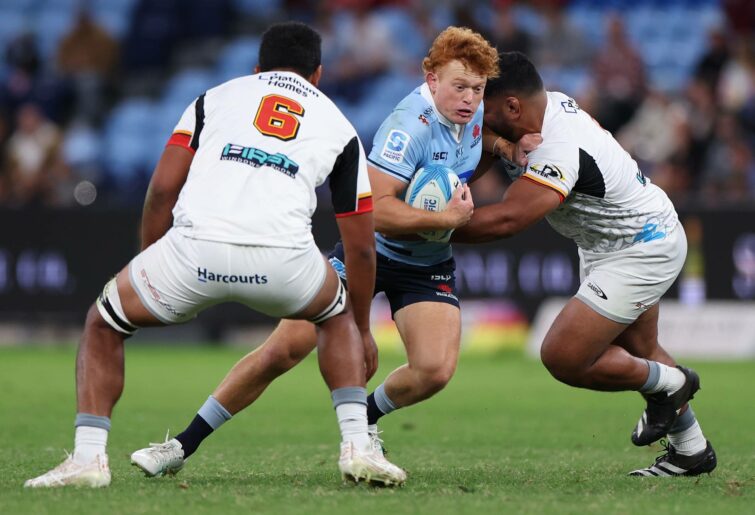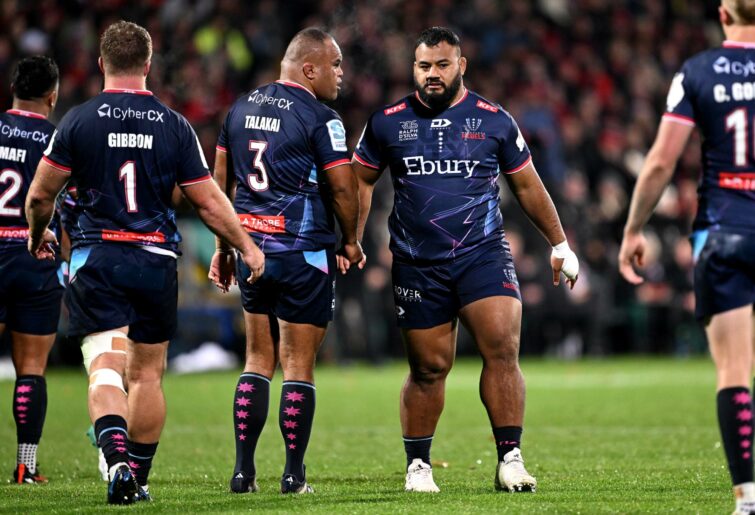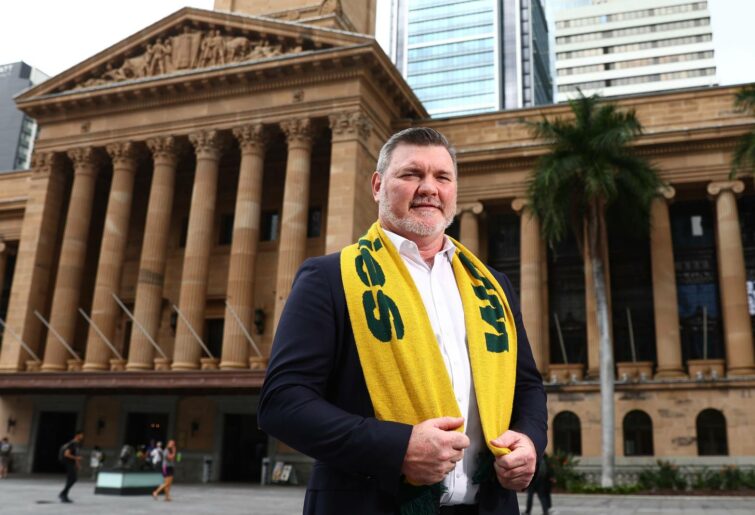Sometimes it’s best to start at the finish. The Waratahs winning the Super W final 50-14 against the Drua was the cap to a terrific weekend of rugby. It goes without saying but, more games for the women, please.
And more of what we saw in Brisbane on Saturday night, too please. This was a terrific match won at the death by the Blues over the Reds, 41-34.
With both sides turning up to run hard and hit hard, it was inevitable that skill errors and mental fades would come into play. But that kind of imperfection is often what makes for the best contests; ebb and flow, attack and counter-attack.
Tied nearing the end of 80 minutes and facing golden point, both sides played to win it in regulation time. Fully fit and invigorated in 2024, Caleb Clarke was offered space down the left touchline and that was the game; a cruel end for a Reds side that might have felt they’d done enough to sneak home.
Certainly, 20-year-old left-wing Tim Ryan had done enough. If his opening two tries were impressive, his third was a stunner. Spare a thought for Darby Lancaster; a crowing rooster one week, forgotten feather duster the next.
It was that sort of night. How about Hoskins Sotutu making like an NFL punt returner, cruising down Clarke’s left wing? Or Suli Vunivalu doing all the hard work early to claim a cross-kick, only to blow it all with a lazy put-down?
Or what about the Reds’ Kalani Thomas, becoming the first Queensland halfback since Peter Slattery in 1991 to be penalised for a crooked scrum feed?
All great entertainment and another tick for what continues to be the most interesting and closely contested Super Rugby season in many years.
Supporting that thesis was the Brumbies’ impressive 27-19 win against the previously undefeated Hurricanes. Having been hosed last week in Auckland, it’s hard to imagine a more impressive turnaround than what the Brumbies delivered.
Their sheer intent and physicality were enough to knock the Hurricanes off their game early, and with Tamati Tua building on his industrious season, they had plenty left in the tank to comfortably hold off any second-half comeback.
Perhaps the Hurricanes were due an off week, and they do seem to have difficulty when they come to Canberra. Repeatedly, the timing between distributors and midfield runners was slightly off-key. But to overstate their failings would be ungenerous to the winners.
Also recovering from a disappointing loss were the Highlanders, 7-6 winners at home against the Force. For those focused on the score, it wasn’t that the match lacked entertainment or intent; both sides had a crack, and there were many try-scoring opportunities created.
What was lacking was composure and skill – important facets to be sure – none better typified by Tanielu Tele’a choosing not to shift the ball on a front-foot overlap, instead shanking an awful cross-kick straight to Kurtley Beale, who in turn, duly had an air-swing with his kick!
Watch every match of Super Rugby Pacific ad-free, live & on demand on the Home of Rugby, Stan Sport
This and a multitude of other inexplicable errors was ‘Keystone Cops’ stuff, perversely amusing for everyone except two highly frustrated coaching groups.
In terms of the ladder and the race for a finals spot, this is a highly damaging result for the Force. In truth though, it feels like both teams won’t be making the cut.
In the Lautoka sweat-box, the Drua weren’t at their best but still did enough to hold off Moana Pasifika, 24-17. The visitors had the better of play for long periods but couldn’t keep their error count low enough to convert their opportunities.
They look to be out of business for the finals as well, but don’t be surprised if they have a nasty surprise in store for one of their remaining opponents.
Friday night feels like a long time ago; thankfully for Rebels fans who saw their side totally dominated by a resurgent Crusaders, 39-0. So comprehensive was the forward pack demolition, the Rebels only had one red-zone attacking opportunity in the whole match, with Josh Kemeny spilling the ball in an effort to dive over players to score.
The Crusaders haven’t yet solved all of their problems, but with their four All Black front-rowers given a serious rev-up, and the outstanding Scott Barrett returning to action, they’ve solved many of the important ones.
The Waratahs’ frustrating season continues, playing some great rugby on their way to a 38-22 loss to the Chiefs. It’s getting very hard to figure out a pathway for them too, to the finals. If they do fall short, mark them down as the best-performing team to miss out since the final eight system was introduced.
A heavy challenge in the first half by Samipeni Finau on Tane Edmed caused plenty of consternation and is worthy of further examination.
Rugby, along with all contact sports, faces a day of reckoning when/if advances in technology demonstrate that brain trauma occurs as a result of forceful tackles, regardless of whether direct head contact is made or not.
Until that happens, it’s not against the laws or spirit of rugby to tackle an opponent as hard as you can. Indeed, for many players and fans, that’s one of the game’s attractions. It’s also not against the laws or spirit of rugby for big men to impose themselves on small men.
If such a physical threat – real or implied – might lead to a fly-half sitting back on his heels instead of probing a running channel, so be it. It’s part of the game.
What smaller fly-halves are entitled to be protected from is indiscriminate attacking of their legs when kicking, contact to head and neck, tackles where a defender’s arms are not wrapping, and late tackles.
Finau’s hit on Edmed was none of those things. Brutal, yes. Right on the edge, yes. But the four officials involved got the non-call right.
The requirement to wrap an arm in the tackle is just that. It’s not the same thing as requiring players to tackle with their arms. There isn’t a coach in rugby – including Edmed’s coaches at the Waratahs – who doesn’t insist upon defenders hitting forcefully with the shoulder. As long as they wrap the arm in the tackling motion.
Finau’s hit on Tom Lynagh in Brisbane was clearly late, and it was a bad mistake by the match officials not to sin bin him for it. Whatever his motivation (the All Blacks’ No.6 jersey vacated by Shannon Frizell is up for grabs), Finau is playing a risky game. He needs to carefully consider what serious damage he might do to an opponent, and his own career, should he get things wrong.

Tane Edmed. (Photo by Mark Kolbe/Getty Images)
But as far as this particular example is concerned, it’s a game he’s entitled to play.
As ever in Australian rugby, it promises to be another busy week off the field, with Rugby Australia’s Annual General Meeting to be held today, and the creditors of the Melbourne Rebels to vote on Friday on a Deed of Company Arrangement (DOCA) as lodged by the former directors of the Rebels.
Media coverage of the Rebels’ situation continues to miss the point. If the creditors vote for the DOCA – remember, these are the people and organisations who actually have a dog in the fight – then pressure will revert to Rugby Australia who will, instead of making vague, non-committal statements about the future of the Rebels and professional rugby in the region, be forced to actually play their hand.
The DOCA is dependent upon Rugby Australia handing the Super Rugby participation licence to the new consortium; hardly an unreasonable request from a group planning to invest $25-30m into the sport over the next five years.
Should Rugby Australia decline, there will be awkward discussions to be had with creditors – most notably the Australian Tax Office – around what justification there might be for taking money out of their pockets. Particularly when the very administrator appointed by Rugby Australia has already approved the proposal.

(Photo by Joe Allison/Getty Images)
There is also the matter of the Victorian state government calling in a penalty clause in their participation agreement if the Rebels are excluded for 2025; said to be around $4.5 million.
Further, it is understood that the Victorian government has advised Rugby Australia that, in the absence of a local professional rugby presence provided by the Rebels, it will withdraw from bidding for future Wallabies Test matches, and hosting the World Cup final.
Imagine the difference in dollar terms to Rugby Australia between what the NSW government is prepared to pay for the final in a mostly non-competitive scenario, versus the VIC government going all out in a competitive tender to maintain its reputation as a global sporting capital.
The Roar Rugby Podcast is on YouTube! Click here and subscribe to make sure you never miss an episode
Pick a number; but make it a big one, in the tens of millions.
Add in the costs of defending a court action – another little understood aspect is the nature of the relationship between the parent body and the franchises, and undertakings made by the parent body in this respect – and even before a loss is contemplated, the cost of dumping the Rebels keeps rising.
Last week, Rugby Australia chairman Daniel Herbert questioned the financial viability of the Rebels and reiterated how Rugby Australia cannot afford to “pay a lot of money into an entity at the moment.”

Rugby Australia Chair Dan Herbert. (Photo by Chris Hyde/Getty Images for Rugby Australia)
Even if we are to set aside an exception being made for the Waratahs and the potential for the Brumbies to be excused a million-dollar-plus loan, with the new consortium pledging to fund the Rebels for two years under the DOCA and a minimum of three years beyond that, it isn’t exactly clear what additional costs (net of the broadcast revenue differential for four teams versus five) Rugby Australia might incur through retaining the Rebels.
What the PWC administrator’s report did lay bare was how the model for professional franchise rugby – in its totality – is highly problematic. The cost structures for all five franchises are inherently similar. Material differences on the revenue side essentially come down to what a private investor or director is prepared to contribute.
Herbert and Waugh are right to address the financial imbalance the game faces. But a knee-jerk or opportunistic strike on the Rebels – or any franchise – is not a sensible way to go about things. Particularly when the one-off transactional costs mentioned above so exceed any potential savings. More so when the rugby costs of handing over fast-growth rugby corridors to rugby league risks repeating the mistakes made in western Sydney.
It’s an immensely challenging situation. Made worse by seemingly everyone with a stake in Australian rugby having a different solution.
Nevertheless, it is well past time for rugby’s leaders in Australia and New Zealand, separately and together, to tackle the game’s problems in a holistic sense, with transparency and genuine strategic expertise.































































































